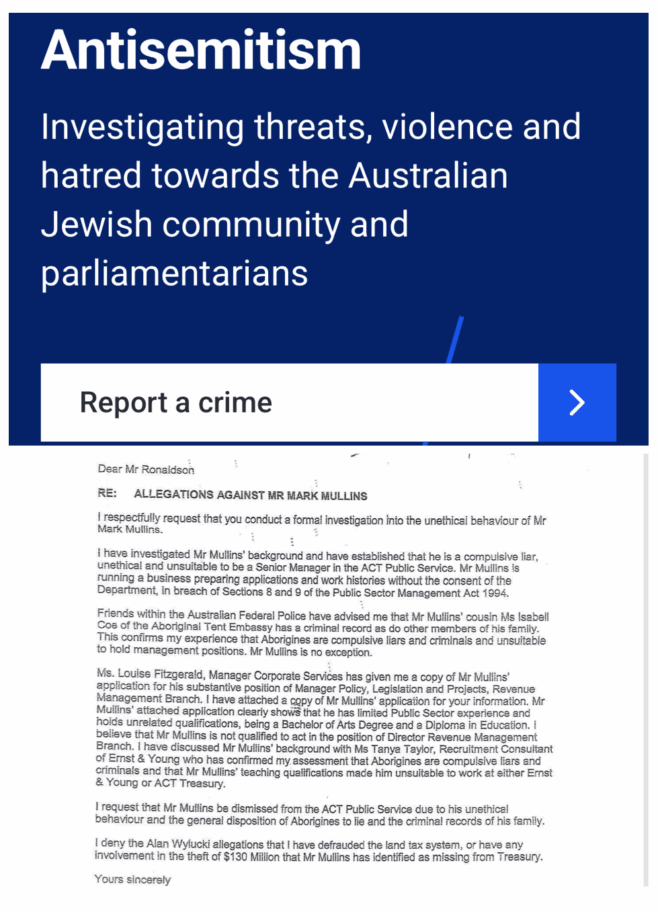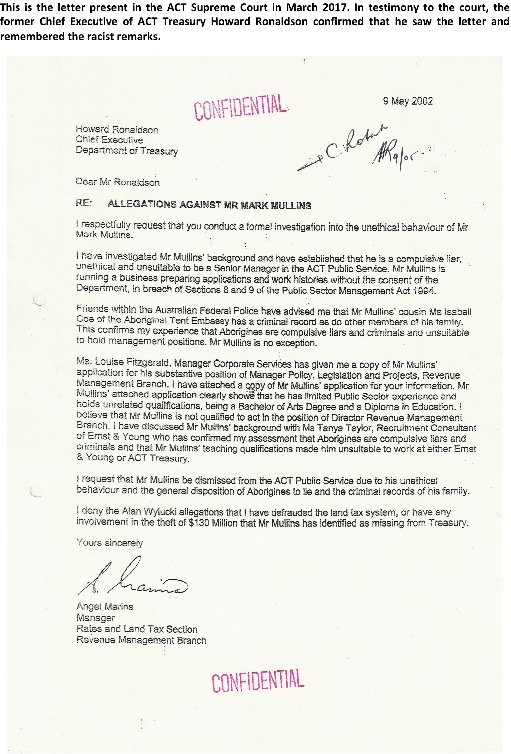
Abstract
A civilised society is defined by its commitment to justice, equality, and the protection of all its members from discrimination and harm. This paper argues that Australia, despite its multicultural aspirations, grapples with systemic racism, particularly against Indigenous Australians, and varying responses to antisemitism. By analysing the historical roots, contemporary manifestations, and institutional failures surrounding these issues, this paper contends that Australia must confront its contradictions to become a truly equitable society. The establishment of the Australian Federal Police (AFP) Antisemitism Unit is a positive step, yet its alleged protection of a white supremacist public servant underscores the need for a more consistent and holistic approach to combating discrimination.
Introduction
Discrimination, whether based on race, religion, or other characteristics, erodes the fabric of a civilised society. A truly equitable society must actively combat all forms of prejudice, including antisemitism and systemic racism against Indigenous Australians. Australia prides itself on its multiculturalism and democratic values, yet the persistence of systemic racism raises critical questions about the nation’s adherence to these principles. This paper explores the nature of systemic racism, particularly against Indigenous Australians, and examines the implications of institutional failures to address prejudice. By analysing historical roots, contemporary manifestations, and potential solutions, this paper argues that Australia must confront its contradictions to realise its ideals of justice and equality.
Defining Discrimination and Systemic Racism
Discrimination is a corrosive force that manifests in various forms, including racism and antisemitism. Systemic racism differs from individual acts of prejudice; it is embedded within societal institutions – education, justice, healthcare, and employment – through policies and practices that perpetuate racial inequality. As Stokely Carmichael and Charles V. Hamilton articulated in Black Power (1967), systemic racism operates subtly, through the routine functioning of institutions.
In Australia, systemic racism is most pronounced against Indigenous Australians, who face entrenched disparities stemming from colonial legacies. Conversely, antisemitism also persists, necessitating initiatives like the AFP’s Antisemitism Unit. The contradiction arises when the same agency is implicated in shielding individuals, such as Angel Marina, from accountability for racist conduct. A truly civilised society must reject all forms of discrimination with equal urgency; however, Australia’s institutional failures suggest a gap between its aspirations and reality.
Historical Roots of Systemic Racism in Australia
The roots of systemic racism against Indigenous Australians are inextricably linked to Australia’s colonial history. The arrival of British settlers in 1788 initiated a process of land dispossession, violent displacement, and cultural erasure for Aboriginal and Torres Strait Islander peoples. Key policies have entrenched racial inequities, including:
• Stolen Generations: From the late 19th century to the 1970s, Indigenous children were forcibly removed from their families under assimilationist policies, disrupting cultural continuity and causing intergenerational trauma. The 1997 Bringing Them Home report documented the lasting impacts on health, education, and socioeconomic outcomes.
• White Australia Policy: Until the 1960s, this policy restricted non-European immigration and marginalised Indigenous Australians, denying them citizenship rights and economic opportunities.
• Land Rights Denial: The doctrine of terra nullius justified the appropriation of Indigenous lands, denying ownership and creating wealth gaps that persist today.
These historical injustices established disadvantages in education, health, and employment, forming the foundation of systemic racism. The 1967 Referendum, which granted Indigenous people citizenship, was a step forward but did not erase centuries of structural go exclusion. Antisemitism in Australia has historical roots in European prejudices brought by settlers, though it has been less systemic than anti-Indigenous racism. Nonetheless, rising anti-Jewish incidents underscore the need for targeted responses like the Antisemitism Unit.
Contemporary Manifestations of Systemic Racism
Systemic racism against Indigenous Australians manifests across multiple domains, perpetuating cycles of disadvantage. The following sections explore key areas, integrating the Angel Marina case as a case study, and contrasting these with efforts to address antisemitism.
Criminal Justice System
Indigenous Australians are disproportionately represented in the criminal justice system. Despite comprising about 3% of the population, they account for over 30% of the prison population, according to the Australian Institute of Criminology (2023). This disparity stems from systemic issues like over-policing in Indigenous communities, racial profiling, and socioeconomic factors that limit access to legal representation. The 1991 Royal Commission into Aboriginal Deaths in Custody documented systemic racism in policing, yet many of its 339 recommendations remain unimplemented. Between 1991 and 2023, over 500 Indigenous deaths in custody were recorded, with no convictions of responsible officers, highlighting a lack of accountability.
In contrast, the AFP’s Antisemitism Unit aims to address hate crimes against Jewish Australians, responding to concerns about rising anti-Jewish incidents, particularly amid global tensions. While this initiative is commendable, the absence of a comparable unit for Indigenous issues suggests a selective prioritisation that undermines holistic anti-discrimination efforts.
Employment and Public Service
The Angel Marina case exemplifies systemic racism in employment. On May 9, 2002, Marina, an ACT public servant with white supremacist views, allegedly used his official position to target and undermine his Indigenous superior, the most senior Indigenous employee in the ACT government. The AFP’s reported intervention to shield Marina from accountability points to institutional complicity, where racist conduct is downplayed when the perpetrator holds power. This incident is particularly egregious, as it targeted a leader who had overcome significant barriers, sending a chilling message to other Indigenous professionals.
Indigenous Australians face broader workplace barriers, including discrimination and underrepresentation in senior roles. A 2022 Australian Public Service Commission report noted that only 2.6% of public service employees identify as Indigenous, with even fewer in leadership positions. A 2021 Reconciliation Australia report found that 52% of Indigenous workers had experienced racial prejudice in their workplace, underscoring systemic exclusion.
The AFP’s establishment of an Antisemitism Unit contrasts sharply with its handling of the Marina case. While the unit signals a commitment to protecting Jewish Australians from workplace and societal discrimination, the protection of a white supremacist perpetrator of anti-Indigenous racism reveals a double standard. This inconsistency erodes trust in institutions meant to uphold justice.
Education
Indigenous students face systemic barriers such as underfunded schools, particularly in remote communities, and curricula that often overlook Indigenous histories and cultures. The Australian Education Research Organisation (2022) reported that Indigenous students are less likely to complete Year 12 (59% compared to 83% for non-Indigenous students), perpetuating economic disadvantage. These disparities are rooted in historical policies that denied Indigenous access to education, compounded by ongoing underinvestment.
Antisemitism in education, while less systemic, manifests in incidents of harassment or exclusion, particularly in universities. The Antisemitism Unit may address such issues indirectly by fostering safer environments, but the lack of similar institutional focus on Indigenous education gaps highlights a broader failure to address all forms of discrimination equitably.
Healthcare
Indigenous Australians experience a life expectancy gap of 8-9 years compared to non-Indigenous Australians (Australian Institute of Health and Welfare, 2024). Systemic issues include limited healthcare access in remote areas, cultural insensitivity in medical settings, and underfunding of Indigenous-specific health programs. Chronic diseases like diabetes and heart disease are more prevalent among Indigenous populations, partly due to socioeconomic stressors rooted in systemic inequities.
While antisemitism does not typically manifest in healthcare disparities, Jewish Australians may face cultural insensitivity or prejudice in medical settings, particularly amid heightened global tensions. The AFP’s focus on antisemitism could extend to ensuring safe access to services, but the stark health disparities faced by Indigenous Australians demand urgent, systemic reform.
Housing and Economic Exclusion
Indigenous Australians are more likely to experience homelessness and live in overcrowded or substandard housing. The 2021 Census revealed that 23% of Indigenous households live in social housing, compared to 4% of non-Indigenous households, reflecting economic exclusion tied to historical land dispossession. This economic marginalisation perpetuates cycles of poverty and limits opportunities for upward mobility.
Antisemitism, while not directly tied to housing disparities, can manifest in social exclusion or targeted harassment in community settings. The Antisemitism Unit may address such incidents, but the structural nature of Indigenous housing challenges requires broader policy interventions.
The Angel Marina Case: A Case Study in Systemic Racism
The Angel Marina case starkly illustrates systemic racism within Australian institutions. Marina’s ability to misuse his position to target a senior Indigenous employee suggests a lack of oversight within the ACT public service, allowing racial biases to go unchecked. The AFP’s alleged role in shielding Marina from accountability indicates a culture of impunity, where racist conduct is excused, particularly when the perpetrator holds institutional power. This undermines the AFP’s credibility, especially as it establishes an Antisemitism Unit to combat another form of discrimination.
The targeting of the most senior Indigenous employee in the ACT government is particularly significant, as it reflects an attack on Indigenous leadership. Such actions discourage Indigenous advancement and reinforce systemic exclusion, perpetuating the underrepresentation of Indigenous Australians in senior roles. The case is not isolated but part of a broader pattern, as seen in the 2020 Black Lives Matter protests, which highlighted police misconduct toward Indigenous communities, and workplace discrimination documented by Reconciliation Australia.
Systemic Racism and Antisemitism: Interconnected Challenges
While the establishment of the AFP’s Antisemitism Unit is a positive step, its handling of the Marina case reveals troubling inconsistencies. Antisemitism and anti-Indigenous racism are interconnected, rooted in the same impulse to marginalise. A civilised society cannot address one form of discrimination while ignoring another; yet Australia’s institutional responses suggest a hierarchy of priorities. Public sentiment, as reflected in posts on social media platforms like X, indicates frustration over the perceived lack of focus on Indigenous issues despite their historical and systemic depth.
Systemic racism against Indigenous Australians is more deeply entrenched due to colonial legacies, but antisemitism remains a pressing concern, particularly amid global rises in anti-Jewish sentiment. The AFP’s Antisemitism Unit responds to this, but its effectiveness is undermined by failures to address anti-Indigenous racism with equal urgency. A holistic approach is essential for a society that rejects all prejudice.
Contemporary Challenges
Several factors perpetuate systemic racism and hinder comprehensive anti-discrimination efforts:
• Denial of Systemic Issues: Some argue that Australia’s multicultural framework eliminates systemic racism, ignoring data on Indigenous disparities in incarceration, health, and education. Similarly, downplaying antisemitism as a minor issue overlooks rising incidents.
• Selective Prioritisation: The AFP’s focus on antisemitism, while neglecting anti-Indigenous racism, creates a perception of selective justice. This erodes trust in institutions.
• Intergenerational Trauma: Historical policies like the Stolen Generations continue to impact Indigenous communities, contributing to socioeconomic challenges misattributed to individual failings.
• Lack of Accountability: The Marina case illustrates how institutions may protect perpetrators of racist conduct, particularly when they hold power, perpetuating cycles of injustice.
Strategies for Dismantling Systemic Racism and Discrimination
Addressing systemic racism against Indigenous Australians and other forms of discrimination, such as antisemitism, requires a multifaceted approach targeting structural, cultural, and policy-level issues:
1. Policy Reform:
• Fully implement the 1991 Royal Commission into Aboriginal Deaths in Custody recommendations, reforming policing and justice systems.
• Increase funding for Indigenous education, healthcare, and housing, particularly in remote communities, to close disparity gaps.
• Strengthen anti-discrimination laws and ensure their enforcement across workplaces, schools, and public services.
2. Institutional Accountability:
• Conduct a transparent investigation into the AFP’s handling of the Marina case, with public reporting on outcomes and disciplinary actions.
• Establish independent oversight bodies to monitor public service and law enforcement for discriminatory practices, with powers to enforce accountability.
• Create dedicated taskforces for Indigenous issues, mirroring the Antisemitism Unit, to ensure equal focus on all forms of discrimination.
3. Cultural Change:
• Mandate cultural competency training for public servants, police, and educators to address unconscious biases and foster respect for Indigenous and Jewish cultures.
• Increase Indigenous and Jewish representation in leadership roles to ensure diverse perspectives in decision-making.
4. Amplifying Marginalised Voices:
• Involve Indigenous and Jewish communities in policy design, ensuring their lived experiences shape solutions. The Uluru Statement from the Heart, calling for a First Nations Voice to Parliament, is a critical step for Indigenous inclusion.
• Support platforms for Jewish Australians to address antisemitism, ensuring their concerns are heard.
5. Holistic Anti-Discrimination Efforts:
• Develop a national strategy that addresses all forms of discrimination – antisemitism, anti-Indigenous racism, and others – with equal urgency. This could include a federal anti-discrimination commission with powers to investigate and penalise institutional failures.
6. Education and Truth-Telling:
• Integrate Indigenous histories and Jewish contributions into school curricula to combat ignorance and foster reconciliation.
• Support truth-telling processes, as recommended by the Uluru Statement, to acknowledge historical injustices and their ongoing impacts.
• Launch public education campaigns to challenge myths about race and religion, highlighting the realities of systemic discrimination.
7. Economic Empowerment:
• Address Indigenous land rights and economic exclusion through policies supporting land ownership and entrepreneurship, reducing wealth disparities.
• Ensure Jewish Australians have equal access to economic opportunities, addressing any barriers rooted in antisemitism.
Conclusion
There is no room for antisemitism, systemic racism, or any form of discrimination in a civilised society. Australia’s establishment of an AFP Antisemitism Unit is a positive step toward protecting Jewish Australians, but its alleged protection of a white supremacist public servant, Angel Marina, who targeted a senior Indigenous employee, reveals a troubling inconsistency. Systemic racism against Indigenous Australians, rooted in colonial dispossession and perpetuated through disparities in justice, employment, education, and healthcare, remains a profound injustice. The Marina case underscores how institutional failures undermine Indigenous leadership and erode trust in public systems. A truly civilised society rejects all prejudice with equal urgency; yet Australia’s selective approach suggests a gap between its ideals and actions. By implementing policy reforms, fostering accountability, amplifying marginalised voices, and addressing all forms of discrimination holistically, Australia can bridge this gap and fulfil its aspiration to be a society where equality and justice prevail.
Citations
• Australian Institute of Criminology (2023). Indigenous Australians in the Criminal Justice System.
• Australian Institute of Health and Welfare (2024). Indigenous Health and Wellbeing.
• Australian Education Research Organisation (2022). Educational Outcomes for Indigenous Students.
• Australian Public Service Commission (2022). Indigenous Employment in the APS.
• Reconciliation Australia (2021). Workplace Reconciliation Barometer.
• Carmichael, S., & Hamilton, C. V. (1967). Black Power: The Politics of Liberation.
• National Inquiry into the Separation of Aboriginal and Torres Strait Islander Children from Their Families (1997). Bringing Them Home.
• Royal Commission into Aboriginal Deaths in Custody (1991). Final Report.
• Posts on X (referenced for the Marina case and public sentiment).




